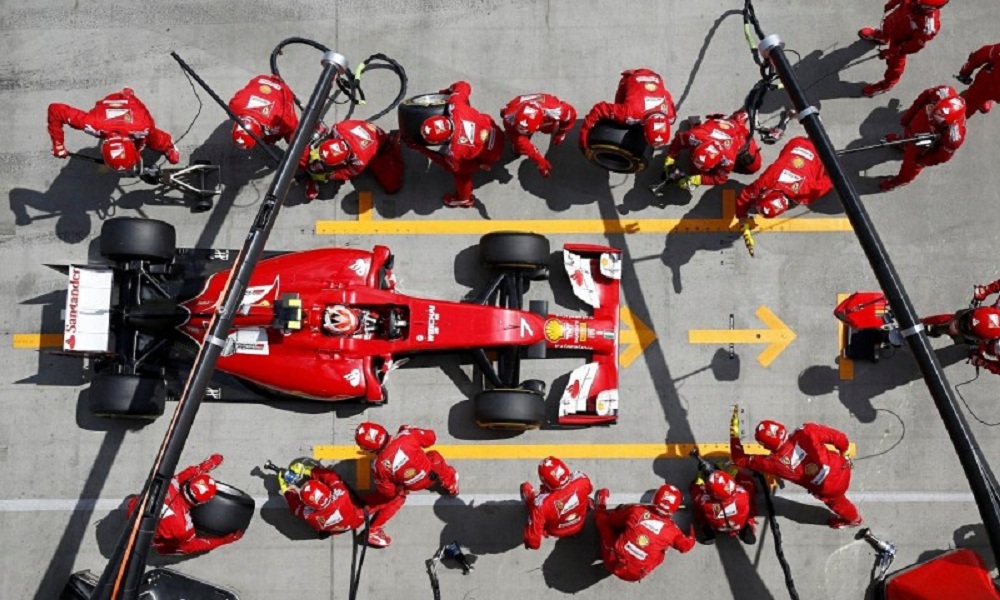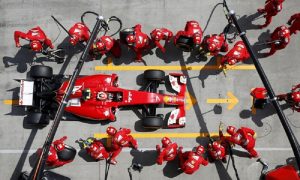Featured Image from: Sportskeeda
Formula 1 is full of absurdities; even this statement is absurd. After all, F1 is probably the most technologically advanced sport in the world. With more people becoming more conscious of technological advancements, F1 isn’t (completely) incomprehensible anymore. Any person with a basic knowledge of how weight affects performance or how the air around you influence how you move, you’ll get F1. At least, why the cars are built that way.
One thing that will dazzle you, as much as it will confuse you, is an F1 pit crew. During most races, you’ll see these 20 individuals change tires. In some, they’re in charge of replacing a damaged wing (bumper, in colloquial terms). 20 people will seem absurd, and if you’ve had your car repaired, it’s something that you would’ve loved because it will mean that you’ll get your car repaired quicker. Still, 20 people to change tires? Even as a longtime F1 fan, I think it’s excessive.
But when you get into why each F1 team needs so many people to perform such simple tasks, you’ll know why it’s so fascinating. You’ll know why these people are the greatest secretaries in the world.
The Most Qualified Mechanics in the World
A man in the F1 pit crew is a part of an F1 team, a most prestigious position, but he’s still a mechanic at the end of the day. But these aren’t just auto repair-level mechanics, these are college-educated, hyper-qualified engineers. This is one of the things that surprised me the most when I started learning about F1 about a decade ago. I’ve been to repair shops. Do you mean to say that those greasy men needed n degree just to work with their hands?
 Then I found out that a number of the pit crew doubles as a mechanic when the team isn’t racing. That’s because there’s no wastage in F1. No unnecessary staff, no less-than-critical part of the crew, everyone has a job to do and will do it from the start to end of any given race day.
Then I found out that a number of the pit crew doubles as a mechanic when the team isn’t racing. That’s because there’s no wastage in F1. No unnecessary staff, no less-than-critical part of the crew, everyone has a job to do and will do it from the start to end of any given race day.
Most importantly, however, the pit crew is responsible for the car, the single most important element to any team. So why bother hiring some of the most expensive athletes in the world if the car is what, ultimately, matters the most? Well, for the fundamental reason that it won’t drive itself. Also, every year, F1 has to contend with new rules that the pit crew/mechanics have to integrate for next season’s car. With the margins that they have to work on, it’s never easy. Whether it’s a modification in the front wing or another restriction, the pit crew/mechanics have their hands full even before the race starts.
Two Seconds is Life
How long did your local garage take in changing your tires? Mine took about an hour, and I’m a regular customer at that place. They couldn’t bother to do it in 30 minutes?
F1 pit crews regularly do it in under 3 seconds, which is even more fantastic to see than it is to hear. For two to three times per race, you’ll see a mass of 20 people in singular focus to change the car’s tires and get it back on the racetrack in as little time as possible. The fastest pit stop ever was 1.92 seconds during the Baku Grand Prix, by none other than the Williams Racing team. They are one of the most prestigious teams in F1, and that’s why their pit crew isn’t alone in figuring things out. They have a person to monitor the performance of the pit crew, namely the human performance specialist Gemma Fisher, who will shave errors and milliseconds off their pit time.
They invest in such practices because pit stops in F1 really matter that much. A thin line separates a good day at the track, and a disappointingly expensive exercise in futility. A good (absolutely, mind-blowingly quick in colloquial terms) pit stop gets you a fresh set of tires, which will help you race better. A bad (with a miniscule error by the gunner, the one who screws in the tires) stop can cost you an entire race. There aren’t that many races in a season for you to recover lost points, especially if you’re not competing for the championship (a regular reality for 70% of F1 teams). And in a sport where the champion is usually decided by a few points, every race lost is points you may never recover and could lose you a precious prize in the end.In addition, the cost of preparing for every race isn’t just counted by every dollar spent; time, effort, and sweat are all exhausted to make sure that the car is in racing condition come race day. In a blink of an eye, these things could mean either that you’re getting a pole position or will be retiring during the race.
So, those two seconds? In F1, those separate life and death.
 Still, given all what the pit crew has to do, it’s not a prestigious job. They get none of the glory, and if they do, it’s as a team and not individually. But that’s okay for them, and it’s okay for us. It’s a treat to see a well-oiled pit crew, and we’re sure the drivers feel the same too. No team ever won without a pit crew, and though they get their hands greasy with only a paycheck waiting for them, us fans appreciate their almost-superman effort.
Still, given all what the pit crew has to do, it’s not a prestigious job. They get none of the glory, and if they do, it’s as a team and not individually. But that’s okay for them, and it’s okay for us. It’s a treat to see a well-oiled pit crew, and we’re sure the drivers feel the same too. No team ever won without a pit crew, and though they get their hands greasy with only a paycheck waiting for them, us fans appreciate their almost-superman effort.
At the end of the day, I’ve learned to look past glory as the ultimate prize in F1. Being able to work in a team is an achievement enough, and if I have to switch places with someone on any pit crew, I would do it. I would exchange my job now for that unglamorous job of changing tires. There’s so much about it that’s so absorbing to me as an F1 fan, particularly the part where practice means perfect. Seeing people so near perfection, that’s something to appreciate.






